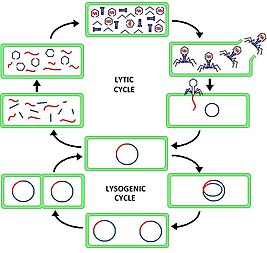Virology Temperateness
In virology, temperate refers to the ability of some bacteriophages (notably coliphage λ) to display a lysogenic life cycle.
Many (but not all) temperate phages can integrate their genomes into their host bacterium's chromosome, together becoming a lysogen as the phage genome becomes a prophage. A temperate phage is also able to undergo a productive, typically lytic life cycle, where the prophage is expressed, replicates the phage genome, and produces phage progeny, which then leave the bacterium. With phage the term virulent is often used as an antonym to temperate, but more strictly a virulent phage is one that has lost its ability to display lysogeny through mutation rather than a phage lineage with no genetic potential to ever display lysogeny (which more properly would be described as an obligately lytic phage).
Induction of the lytic cycle
At some point, temperate bacteriophages switch from the lysogenic life cycle to the lytic life cycle. This conversion may happen spontaneously, although at very low frequencies (λ displays spontaneous conversion of 10−8 to 10−5 per cell). In the majority of observed switch events, stressors - such as the cell's SOS response (due to DNA damage) or a change in nutrients - induces the switch.
Lysogenic and lytic cycles
Temperate phages can switch between a lytic and lysogenic life cycle. Lytic is more drastic, killing the host whereas lysogenic impacts host cells genetically or physiologically. Here is a chart on temperate phages that are lytic and lysogenic and how they’re related. lysogeny is characterized by the integration of the phage genome in the host genome.
| Host | Temperate Phages |
| Escherichia coli | E. coli prophage, SUSP1, SUSP2 |
| Salmonella | Fels-2, Enterobacteriaceae |
| Vibrio cholerae | CTX𝜑 |
| Staphylococcus aureus | Staphylococcal phages |
| Clostridium perfringens | Clostridium phage phiMMP01, vbCpeS-CP51, Staphylococcus phage |

Notes
This article uses material from the Wikipedia English article Temperateness (virology), which is released under the Creative Commons Attribution-ShareAlike 3.0 license ("CC BY-SA 3.0"); additional terms may apply (view authors). Content is available under CC BY-SA 4.0 unless otherwise noted. Images, videos and audio are available under their respective licenses.
®Wikipedia is a registered trademark of the Wiki Foundation, Inc. Wiki English (DUHOCTRUNGQUOC.VN) is an independent company and has no affiliation with Wiki Foundation.